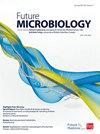抗坏血酸是抗白色念珠菌炎症反应的调节剂。
IF 2.5
4区 生物学
Q3 MICROBIOLOGY
引用次数: 0
摘要
目的:评估口腔角质细胞在维生素 C(Vit C)存在下的行为及其抗炎潜力。材料与方法:首先将口腔角质细胞暴露于 0.1-2.5 mM 的维生素 C,然后分别使用 MTS 检测法和 Ibidi 培养插片评估细胞的代谢活性和迁移。然后,用白色念珠菌挑战细胞,并通过 qPCR 分析炎症标记物。结果显示维生素 C 能延缓细胞在 48 和 72 小时内的迁移,并能下调 IL-8 和 IL-1β 基因。结论维生素 C 具有抗炎潜力,可以作为抗真菌治疗的一种有趣的辅助剂。本文章由计算机程序翻译,如有差异,请以英文原文为准。
Ascorbic acid as a modulator of inflammatory response against Candida albicans.
Aim: To evaluate the behavior of oral keratinocytes in the presence of Vitamin C (Vit C) and its anti-inflammatory potential. Materials & methods: Oral keratinocytes were initially exposed to 0.1-2.5 mM of Vit C and the metabolic activity and cell migration were evaluated using MTS assay and Ibidi culture inserts, respectively. After, the cells were challenged with Candida albicans and inflammatory markers were analyzed by qPCR. Results: The treatment was not cytotoxic, and the highest concentrations increased the metabolic activity at 24 h. Vit C delayed the cell migration at 48 and 72 h. Interestingly, it downregulated the genes IL-8 and IL-1β. Conclusion: Vit C could be an interesting adjuvant to anti-fungal treatment due to its anti-inflammatory potential.
求助全文
通过发布文献求助,成功后即可免费获取论文全文。
去求助
来源期刊

Future microbiology
生物-微生物学
CiteScore
4.90
自引率
3.20%
发文量
134
审稿时长
6-12 weeks
期刊介绍:
Future Microbiology delivers essential information in concise, at-a-glance article formats. Key advances in the field are reported and analyzed by international experts, providing an authoritative but accessible forum for this increasingly important and vast area of research.
 求助内容:
求助内容: 应助结果提醒方式:
应助结果提醒方式:


